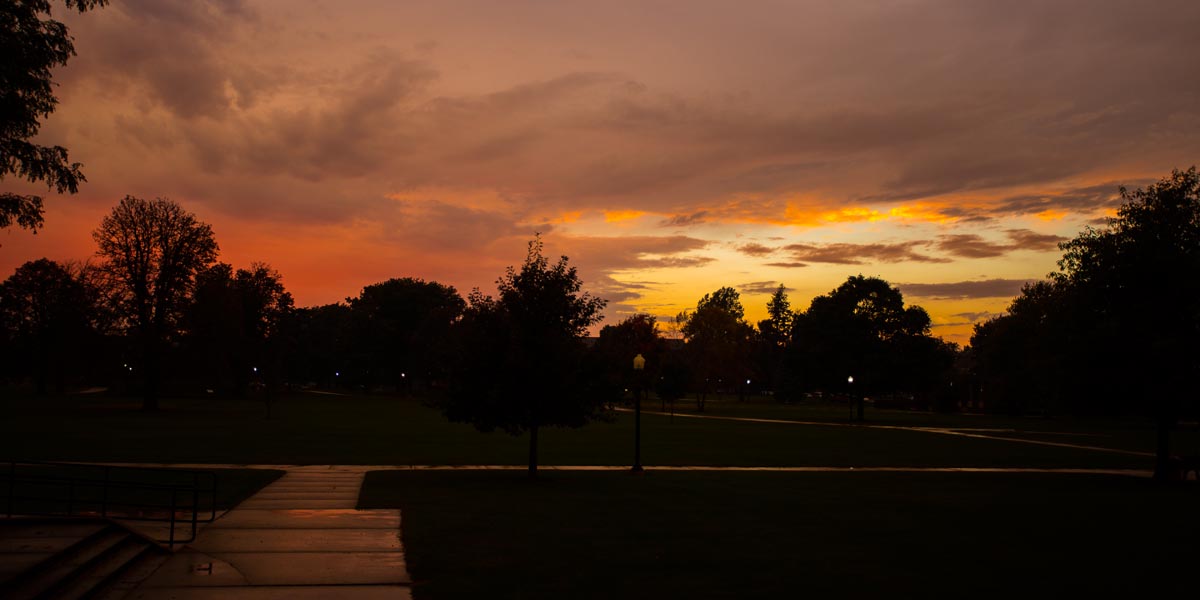



By Jane Carlson
Kelsie Pos didn’t experience serious anxiety before she went to college. But when the sophomore biology major first arrived at Knox from Salt Lake City, symptoms almost immediately began to brew. Pos struggled with new standards of academic rigor and deciding on a major, being away from her family, and the pressure to take advantage of all Knox has to offer, academically and socially. “When you come here, you’re trying to blaze your own trail,” Pos said. “You know the importance of being in college and you want to make the most of it, but it is difficult.”
Pos isn’t alone. Nationally and at Knox, anxiety in recent years has surpassed mild to severe depression as the most prevalent presenting mental health concern on college campuses. While all students experience some level of stress, Pos felt overwhelmed and was experiencing physical manifestations of her anxiety. So she sought help through the counseling center, and now serves on the Health and Counseling Center Advisory Board, one of several initiatives at Knox to address an uptick in anxiety and mental health concerns.
“The resources are growing, and there’s so much more that people can get from the counseling center than people are aware of,” Pos said. “I think this is the first year the counseling center is distinctive from the health center.”
According to a 2014 study from the Center for Collegiate Mental Health, mental health and counseling centers have seen an 8 percent increase in use on U.S. campuses. At Knox, the percentage of students who seek mental health counseling had been hovering between 20 and 23 percent but reached 25 percent in the 2014-2015 academic year, according to Dan Larson, director of counseling services. Data from the 2014 National College Health Assessment II research survey from the American College Health Association reveals 19 percent of Knox students surveyed said they were treated or diagnosed for anxiety within the previous 12 months, including 10 percent of the men and 20 percent of the women surveyed. This is in line with 21 percent of students nationally who were diagnosed or treated for anxiety within the time period, according to Charles Clark, chief institutional research officer.
Where Knox more significantly surpasses the national figures is students experiencing feelings of helplessness and overwhelming anxiety but not necessarily seeking treatment or being diagnosed within the last 12 months. Nationally the total is 62 percent—including 66 percent of females and 49 percent of males surveyed. At Knox, 70 percent of the students surveyed reported experiencing those feelings, including 77 percent of females and 48 percent of males surveyed, according to Clark.
That discrepancy isn’t necessarily reason for alarm at Knox in terms of anxiety levels. Larson said Knox is within the range for residential liberal arts colleges. Slightly higher numbers do not necessarily reflect a much greater need for services but, rather, that there may be less of a stigma at Knox for seeking treatment, he explained.
What’s important, Larson stressed, is giving the students the tools and knowledge to identify problems and to continue reducing stigma in seeking treatment.
“We want the students to make the call, and to put them in control,” Larson said. “Our role is to make sure they know what services we have, that it’s confidential, that there shouldn’t be any stigma, and there is no extra cost.”
Clark said Knox is reflecting national trends with its increase in anxiety cases over the past few years. “We are a little higher but I think the majority of institutions are grappling with this situation,” Clark said.
To meet the demand, Knox has added a second full-time counselor and sexual assault advocate. Two part-time counselors are also on hand, as the counseling center works to address concerns of long wait times to see a counselor during peak times of stress each term. The new Health and Counseling Center Advisory Board, comprised of staff and students, serves as the eyes and ears of what students are talking about on campus, works to reduce the stigma of seeking counseling, educates students about stress and anxiety, and focuses on sexual assault prevention. As part of those efforts, numerous group therapy opportunities are now available to students, on topics including stress, anxiety, and eating disorders, and are offered at times that are easy to fit into students’ schedules.
“Because of confidentiality issues, group sessions have been difficult in the past, but culturally, we are starting to be more open to them,” Larson said. Increasing awareness of the services available in the counseling center has been a charge of Janell McGruder, staff counselor and sexual assault advocate at Knox since fall 2015. In addition to counseling students and serving as a confidential advocate for students dealing with sexual assault and the Title IX process, McGruder works to make available services known to students via online newsletters and campus programs such as Wellness Wednesdays and Mindful Mondays.
In response to awareness of the negative impacts of stress and anxiety on students’ success, Knox is also offering research-based online training simulations that can help students, faculty, and staff better understand mental health concerns on campus and take the necessary steps for treatment. Larson and McGruder said the increased staffing and extensive student involvement has improved service and outcomes at the counseling center, although with more resources, outreach and prevention efforts could be even further enhanced, and students still do experience wait times for non-emergency counseling services. Likewise, a lack of psychiatric care available locally is a concern, Larson said.
“Our role here is to make sure students know what counseling services we have, and there is no stigma and no extra cost,” Larson said. “There’s no problem too small or too large; we are a good first step in addressing a problem. If additional outside resources are needed, we can help in the referral process.”
Better addressing and enhancing the wellness needs of students is one of the main tenets of Knox’s Becoming One Community initiative, which seeks to eliminate barriers of equity and inclusion that prohibit students from full participation in every educational opportunity. It is an acknowledgment that students who have suffered assault or trauma or who have mental health conditions may need different kinds of support to succeed.
Dean of Students Deb Southern said the College’s role in assessing and addressing mental health concerns is to help students take advantage of all educational opportunities available, and to give students the resources needed to deal with the issues that stand in the way of their success.
“As a residential liberal arts college, we have an obligation to help our students learn to negotiate the world, and that includes how to access help and services in the community when they are needed,” Southern said. This also means the College needs to continually assess needs and carefully allocate resources, not simply identify a need and add services, Southern said. Using data, the College will target and prioritize mental health services to best serve students.
“A student is a whole person, so you need to deal with the whole person— intellectual, physical, spiritual, and emotional,” Southern said. “Developmentally, you cannot just address the intellectual part of person. You have to do it holistically, and that’s what a residential liberal arts college does. We’re not protecting people from bad things. We’re helping them to negotiate those things in a supportive environment.”
Editor's Note: After the magazine went into production, we learned that Dan Larson was stepping down as director of counseling services to pursue his private practice. Janell McGruder will serve as interim director until the position is filled permanently.
6
years on the Forbes Grateful Grads Index
where alumni feel they received the greatest return on their college investment